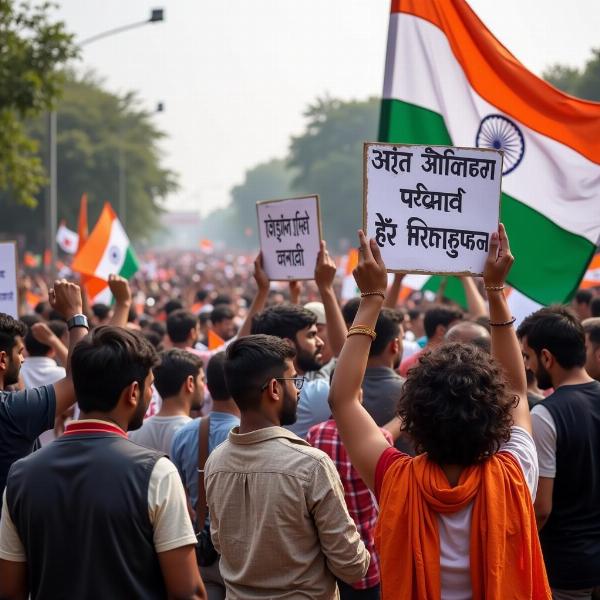Unpatriotic, often translated as “deshdrohi” (देशद्रोही) in Hindi, carries a heavy weight of cultural and historical significance. Understanding its meaning goes beyond a simple dictionary definition; it delves into the complexities of national identity, loyalty, and dissent in Indian society. What constitutes unpatriotic behavior, and how is it perceived within different social and political contexts? This article explores the nuances of “unpatriotic meaning in Hindi,” examining its various interpretations and implications.
Defining “Deshdrohi” and its Synonyms
“Deshdrohi” literally translates to “traitor to the country.” “Desh” (देश) meaning country and “drohi” (द्रोही) meaning traitor. It’s a term used to describe individuals or actions perceived as undermining the nation’s interests or betraying its people. While “deshdrohi” is the most common translation, other terms like “rashtradrohi” (राष्ट्रद्रोही) – where “rashtra” also means nation – and “swadeshdrohi” (स्वदेशद्रोही) – with “swadesh” emphasizing one’s own country – convey similar sentiments. These terms often carry a strong emotional charge and are used in politically charged discussions.
 Unpatriotic Protests in India
Unpatriotic Protests in India
What Actions are Considered Unpatriotic in India?
The definition of unpatriotic behavior can be subjective and varies depending on individual perspectives and prevailing political discourse. Actions commonly considered unpatriotic include:
- Supporting enemy nations: Actively aiding or collaborating with countries hostile to India.
- Espionage and treason: Leaking sensitive information or engaging in activities that compromise national security.
- Disrespecting national symbols: Insulting the national flag, anthem, or constitution.
- Inciting violence or disharmony: Promoting hatred and division along religious, caste, or regional lines.
- Criticizing the government excessively: While constructive criticism is part of a healthy democracy, some view excessive or unfounded criticism as unpatriotic, especially when it undermines national unity.
The Cultural Context of “Deshdrohi”
The concept of patriotism is deeply ingrained in Indian culture, with a strong emphasis on unity and national pride. This makes the accusation of being “deshdrohi” particularly damaging. It can lead to social ostracization and even violence.
The Role of Media and Politics
The media and political parties often play a significant role in shaping public perceptions of patriotism and unpatriotism. The term “deshdrohi” can be used as a political tool to silence dissent or discredit opponents. This can create a chilling effect on free speech and open dialogue.
Navigating the Grey Areas
The line between legitimate criticism and unpatriotic behavior can be blurry. It’s essential to differentiate between questioning government policies and actively undermining the nation’s interests. Constructive criticism is crucial for a functioning democracy and should not be equated with disloyalty.
Legal Ramifications of “Deshdrohi” Accusations
While the term “deshdrohi” itself doesn’t have a specific legal definition in India, certain actions associated with it, such as treason and sedition, are punishable under the Indian Penal Code. These laws have been subject to debate and criticism, with concerns about their potential misuse to suppress dissent.
Conclusion: Understanding the Nuances
Understanding “unpatriotic meaning in Hindi” requires considering the cultural, political, and legal context. While patriotism is a vital aspect of national identity, it’s essential to protect free speech and ensure that accusations of “deshdrohi” are not used to stifle legitimate dissent. Engaging in respectful dialogue and promoting critical thinking are crucial for a thriving democracy.
FAQ
- What is the literal meaning of “deshdrohi”? It literally translates to “traitor to the country.”
- Is “deshdrohi” a legal term in India? No, it’s not a specific legal term, but related actions like treason are punishable by law.
- Can criticizing the government be considered unpatriotic? Constructive criticism is not unpatriotic, but excessive or unfounded criticism that undermines national unity can be viewed as such.
- What is the difference between “deshdrohi” and “rashtradrohi”? They are essentially synonyms, both meaning “traitor to the nation.”
- How does the media influence perceptions of unpatriotism? The media plays a significant role in shaping public opinion on what constitutes unpatriotic behavior.
- Why is the accusation of being “deshdrohi” so serious in India? Due to the strong emphasis on national unity and pride in Indian culture.
- What are the legal implications of engaging in unpatriotic activities? Actions like treason and sedition, which are often associated with unpatriotism, are punishable under Indian law.
Meaning-Hindi.in is your premier source for professional Hindi translation services. We specialize in various fields, including business and commercial document translation, certified and legal document translation, technical and user manual translation, website and localization services, educational and academic document translation, and express translation services. Our team of expert linguists ensures accurate and culturally sensitive translations for all your needs. For high-quality Hindi translations, contact us today! Email: [email protected], Phone: +91 11-4502-7584. Let Meaning-Hindi.in be your trusted partner for all your Hindi translation requirements.